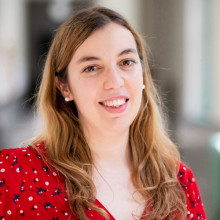On 20 September 2021, FAIRsFAIR organised the workshop “Learning lessons from FAIR data implementation. Good practices from universities across Europe” during the Open Science Fair 2021. The event offered participants the opportunity to discuss a preliminary analysis of good practices from universities across Europe that are being gathered by the project partners, highlighting the drivers, impact and implementation steps behind initiatives taken by institutions to integrate Research Data Management (RDM) and FAIR data skills in university curricula.
Representatives of the FAIRsFAIR project kicked off the day by sharing results on the project’s efforts in supporting the implementation of FAIR data-related skills, training and practices in higher education institutions. Federica Garbuglia (FAIRsFAIR and European University Association) presented preliminary findings from the forthcoming report “Good practices in FAIR competence education”, which will be published in December 2021. Elizabeth Newbold (FAIRsFAIR and Science and Technology Facilities Council) shared lessons learned and reflections from the FAIRsFAIR Data Steward instructor training series, which organised train-the-trainer activities aimed at instructors delivering training within their own institutions. Angus Whyte (FAIRsFAIR and University of Edinburgh) introduced the “Assessing Capability Maturity and Engagement (ACME)” framework developed for research-producing organisations to self-assess their capabilities to enable FAIR data practices.
The presentations from the FAIRsFAIR project’s partners highlighted how diverse initiatives are being taken by higher education institutions to support the uptake of FAIR and RDM skills and practices. These are driven by new policy developments at the European, national and institutional levels, but also by the motivation of members of the staff to build capacity and bring needs and challenges related to RMD and FAIR data to the attention of the leadership. In this regard, training initiatives such as the FAIRsFAIR instructor training are instrumental in fostering the capacity of Data Stewards to be drivers for change within their institutions. At the same time, tools like the ACME framework can support universities in assessing their readiness to support RDM and FAIR data practices, and in identifying new needs and challenges to address in order to improve their performance. ACME identifies 7 themes covering such practices. A complete draft for consultation will be published in November. Meanwhile comments are appreciated on the theme “Professionalising roles through training, mentoring and recognition” (working draft here).
 In the second part of the workshop, participants joined breakout rooms to discuss the first findings of the FAIRsFAIR good practices report. In particular, they were invited to reflect on what drives and sustains institutional training initiatives for RDM and FAIR data skills, through the lenses of their scope and objectives, their capacity needs, their implementation and the impact they can reach.
In the second part of the workshop, participants joined breakout rooms to discuss the first findings of the FAIRsFAIR good practices report. In particular, they were invited to reflect on what drives and sustains institutional training initiatives for RDM and FAIR data skills, through the lenses of their scope and objectives, their capacity needs, their implementation and the impact they can reach.
The breakout room discussions highlighted the key role of higher education institutions in supporting the uptake of FAIR and RDM data skills and contributing to the development of the new generation of data skilled professionals. Funding requirements at the European and national level are major drivers, but universities are the main actors guiding and implementing this transition in practice by promoting training opportunities for their students, researchers and staff. While ensuring the support of the leadership is key, universities’ leaders are still perceived as not being engaged enough with matters related to FAIR data. This, together with the lack of dedicated staff, can hinder the capacity of higher education institutions to implement and sustain dedicated training initiatives and, ultimately, the emergence of good RDM and FAIR data practices. Linking FAIR data needs to other priorities in the institutional agenda is seen as a good strategy to capture the attention of university leaders. Moreover, implementing institutional policies for Open Science and developing new infrastructures are crucial to sustain and enhance the impact of training activities in the long term.
A full overview of the input received in the breakout rooms is available here.
The workshop recording is available here and presentations can be downloaded from Zenodo here.
This event closes a series of three Stakeholder Workshops organised in the context of FAIRsFAIR’s activities to support the integration of FAIR-related content in university curricula and teaching. Links to the presentations and recordings of previous events are available here and here.

